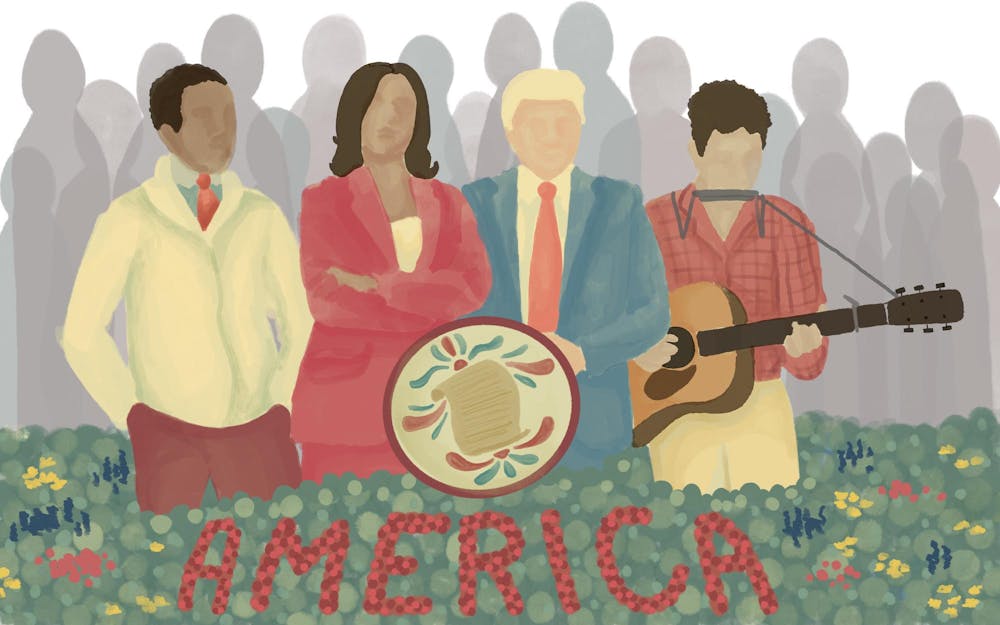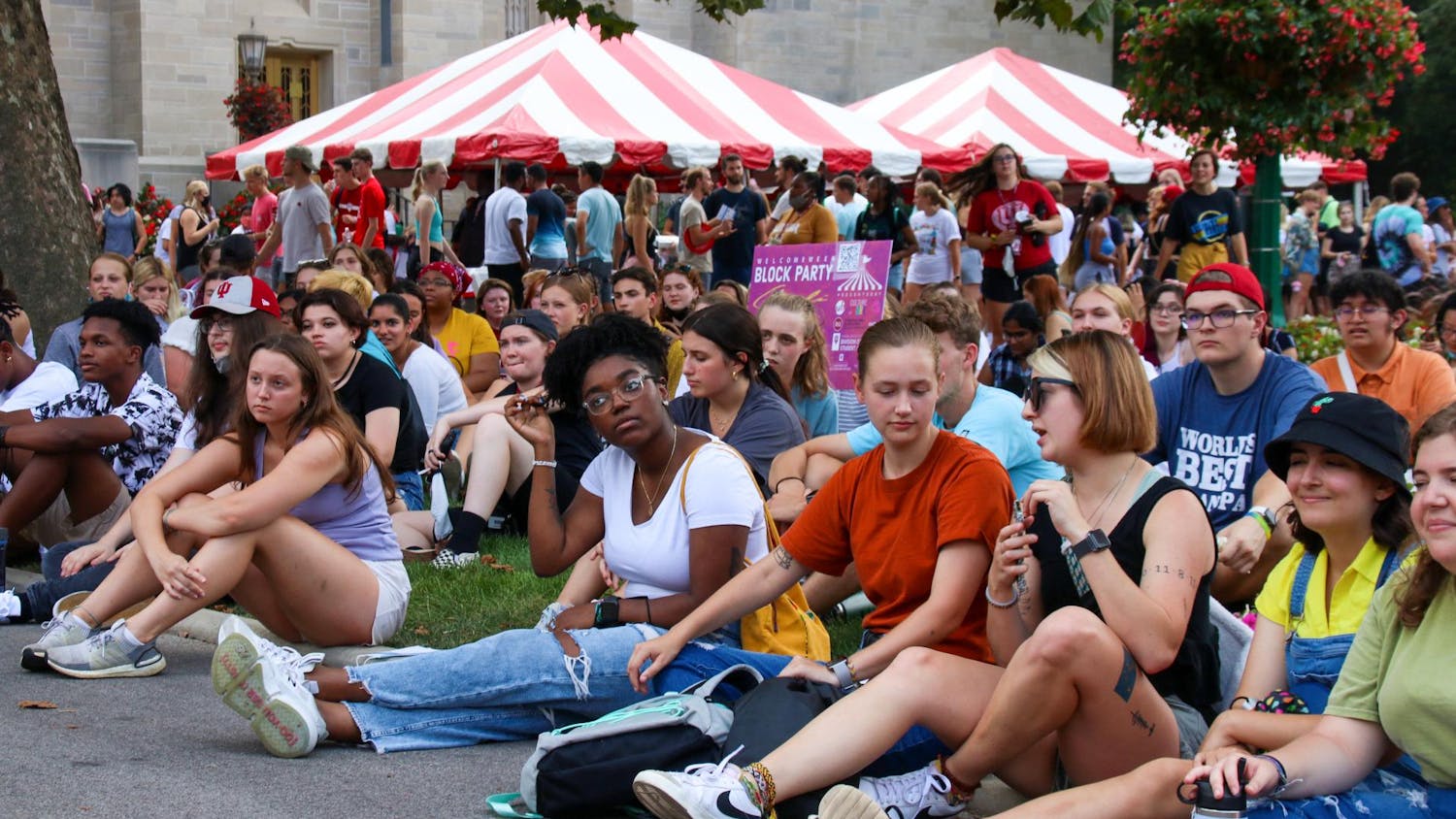Editor's note: All opinions, columns and letters reflect the views of the individual writer and not necessarily those of the IDS or its staffers.
We, the people, must redeem
The land, the mines, the plants, the rivers.
The mountains and the endless plain—
All, all the stretch of these great green states—
And make America again!
— Langston Hughes
The presidential election year is a year of celebration and a year of sorrow, at once a party and a funeral procession. I was at a house show the Saturday after Halloween, the Saturday before Election Day, and the drummer in one of the bands was dressed up as Uncle Sam. I was reminded of the documentary “Gimme Shelter,” wherein Mick Jagger was fitted with a similar garb at the 1969 Altamont Free Concert: a concert that, infamously, ended with the deaths of four people. It was a snap back to reality from the heady trip of the ‘60s, a reminder that the center was crashing in on itself and peace and love were far from the collective spirit.
That same Saturday, I was on campus reading Allen Ginsberg’s 1956 poem “Howl” for my Introduction to Poetry class. It’s a lot of things, but at its core it’s a celebration of the so-called “angelheaded hipsters” who, disillusioned with the status quo, represented a nation of young people desperately vying for change — a change they’d soon find in the burgeoning counterculture. While I was reading, an older woman passed by and stopped to see what I was doing.
“Oh, you’re reading ‘Howl’ — that’s cool!” she said.
And, as she shuffled off, she stopped as if she suddenly remembered: “Don’t forget to vote!”
In a twist of fate, we were scheduled to talk about this poem, and the Beat Generation as a whole, in class the morning of Election Day. It felt appropriate, having a conversation about these authors who were ushering in, through their art, a social revolution. We opened by listening to and analyzing Bob Dylan’s “The Times They Are A-Changin’,” and, somehow, his cracked, cigarette-addled croon still succeeded in speaking to the tumultuous absurdity of the moment.
And it is all absurd. There’s a certain feeling of existentialism that comes with the election year, a startlingly American existentialism that feels almost like a road trip to the object of our national Dream that, despite being totally imagined, still seems completely unimaginable. Every four years, like melting clockwork, we’re inundated with cautious patriotism, a cacophonous chorus of voices crying to us, pleading for us, to vote because the future of our country depends on it. And, of course, this necessarily means that human life itself depends on it.
After class, I hitched a bus back to my apartment and I drove to the Bloomington Eastview Church of the Nazarene and I voted. That night, Donald Trump, once again, won the election.
* * *
This is not a column about the United States of the 1960s, however: it’s a column about the United States of 2024, a retrospective on a year of pandemonium. But that mid-century era feels weirdly relevant, doesn’t it? It continues to haunt the country like a ghost, inspiring a hundred think pieces on the parallels between now and 1968. Trump’s attempted assassination in July, the torrent of campus anti-war protests, the sitting president’s decision to step out of the race and, of course, his replacement by the Republican opposition. Trump, like Nixon 56 years ago, took advantage of a split in the Democratic Party: progressive voters, then and now, were disillusioned with establishment politics, and I still contend Kamala Harris lost, in part, because of it.
This culture of disillusionment has been well documented, especially among younger voters. I talked to several people over the past several weeks who’ve divulged similar feelings, people who either chose not to vote for Harris out of protest or voted for her begrudgingly. At a Hutton Honors College watch party the night of the election, Ram Cassidy, a junior studying psychology, and a transgender man, expressed his dismay with this election again being between the “lesser of two evils,” that adage of American politics that never ceases to be relevant. He voted for Harris, not because he was particularly excited by her policies and rhetoric but because she was, ultimately, better than Trump.
“I’m voting for my own rights, and because it’d be nice to not be criminalized,” he said. “And we’re also more likely to sway Kamala on things like trans rights and Palestine.”
I sat in, too, on a town hall, titled “New Strategy of the Left,” held at Redbud Books on Nov. 14. Here, attendees engaged openly with this feeling of alienation with electoral politics, and the topics ranged from the importance of community spaces like libraries and homeless shelters to the nature of civil disobedience. But all of it came down to one thing: Harris lost because the establishment opposition didn’t do enough, but it doesn’t need to be this way.
Even at the Monroe County Democratic Party watch party the night of the election, though far more optimistic for a Harris presidency than some of the progressive spaces I was used to, there was an unavoidable hint of trepidation. Damian Arambula, press secretary for the IU College Democrats, was sympathetic toward left-wing voters who had spent the cycle protesting Harris’ campaign.
“She has this famous bit, the ‘I’m speaking,’ and people eat it up,” he said. “I don’t. I think people have a right to protest the politicians of their own party.”
However, he still contended that progressives had a responsibility to vote for her over the radical right-wing sect of government that Trump represents. The two-party system is flawed, he said, but it’s simply the reality of the current moment.
In the end, though, Trump garnered roughly 2.2 million more votes than Harris; for comparison’s sake, she ended up with about 7 million less votes than Joe Biden in 2020, and Trump received about 3 million more than he got then. This discrepancy cannot simply be explained by a hard rightward shift in the electorate: Harris and the Democratic Party did something wrong, and that’s precisely where we ought to begin the discussion.
* * *
I’m not looking to provide an electoral analysis; I’ll make no pretense at even trying to grasp for some solution to the problems we’re facing. These things are important, but I find little interest in them. What I find much more interesting is what this sense of dejection says about our collective understanding of “America” as an abstract concept: I opened this column with an epigraph from Langston Hughes’ poem “Let America Be America Again” precisely because it enunciates, better than I ever could, this portrait of America as an unrealized idea.
Hughes, a Black man born in 1901, knew better than perhaps anyone the material cruelty of the American experiment. When he cries “make America again!” — a phrase that, today, is almost impossible to not subconsciously associate with Trump’s campaign slogan — he isn’t hearkening to some mythical period of greatness. He’s using the concept of America, the concept espoused by our founding documents, the concept that, to date, hasn’t been. But it can be, and it must be, and we have the power to make it be.
It's entirely possible we'll search our entire lives and never find America; but it's also possible that through our activism, through our, as James Baldwin put it, insistence "on the right to criticize her perpetually," we can one day craft a state that really lives up to its ideals. It's true that these contradictory feelings of optimism and disillusionment aren't easy to reconcile, but it is not impossible. Anything else would be surrending to despair. We absolutely mustn't give up in our search for America — it is, in the end, all we have.
Joey Sills (he/him) is a senior studying English, comparative literature and political science.






